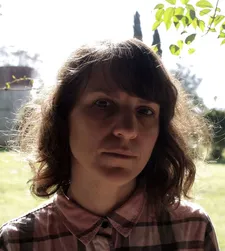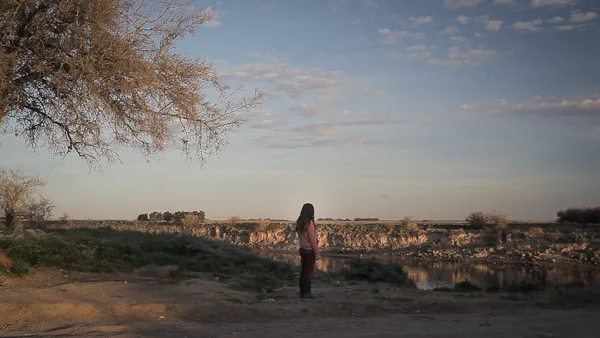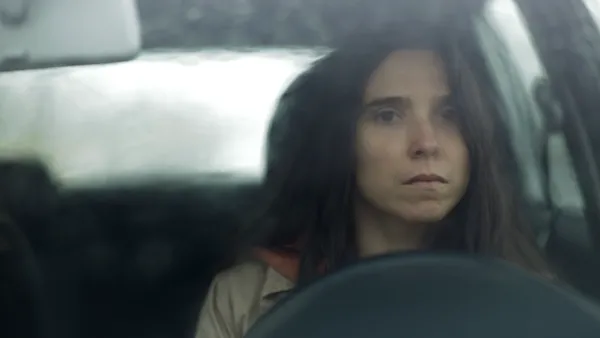Laura Citarella’s Trenque Lauquen - which opens today (April 21) in New York before screening elsewhere in the US - is the sort of work you can kick back and relax into. Her story, which runs across more than four hours and two films, takes viewers not only on a journey into multiple stories through the consideration of a single life but also on a walk across a cinematic landscape, from historical romance to mystery drama and something altogether more fantastical.
The story is driven by, though not always centred upon, Laura (played by Laura Paredes, who co-wrote the script), a botanist who is collecting orchid samples in Trenque Lauquen - a real place in Argentina. She deliberately vanishes at the start of the first film, which brings together two men in her life, Rafael (Rafael Spregelburd) and Ezekiel (Ezequiel Pierri). This initial mystery will soon fan out into others - including one sparked by a letter found between the pages of a book and another that surrounds sightings of a strange creature by a lake.
Even the film itself marks a portion of a longer imagined project centring on a group of films that began with 2011’s Ostende, which sees a character, called Laura, “live different lives in different towns in the province of Buenos Aires”.
Although the end result is an intricate piece of storytelling, Citarella says it originally unfolded in a much “more linear way”.
 |
| Laura Citrella: 'I always think of scripts once I know the places because that’s the way scenes come to mind' Photo: El Pampero Cine |
She adds: “It was structured in another way but the things happening in the film were the same. We started shooting the film in 2017 and then I got pregnant. So, we continued shooting, but then we had to have a pause, of course. And at that moment, we tried to make a first cut of the film. And when we saw it, we found there was something about this chronological structure that was not helping to work the mystery, the way the film now works the mystery. Now, what happens is that you get into the film through the eyes of two guys who are looking for a girl and they have their own ideas of what happened. And so you, as an audience, can have a personal relationship with this information and with this mystery.
"When we had a structure that was more classical, you didn't have the chance to have your own opinion or your feelings about what the mystery was about. So we decided to start the film with this scene with Ezekiel and Rafa just working with this idea of L’Avventura, the film by Michelangelo Antonioni - this idea of a woman who is no longer there, and you don’t why she left, but she did that because she wanted to not because something dangerous happened to her. The idea was to work from the beginning, the point of departure.”
Speaking about her collaboration with Paredes, Citarella says that they decided they wanted to “continue working with the character” after Ostende.
She explains: “In that moment, we decided to take this character to another town in Buenos Aires to, in a way, renew the fictional universe. We wanted to try similar things to Ostende but we were 10 years older. So our feelings, our ideas of cinema, our enthusiasm for cinema was different from 10 years before.
“Trenque Lauquen is the town where my family comes from, so I know it very well. So I started thinking of the places. I always think of scripts once I know the places because that’s the way scenes come to mind. So first I wrote a treatment and then I decided I didn't want to work alone so I called Laura. And it was great, because I had a partner to whom I could talk every day about the film and who also was the main character. So that was interesting for writing, because every time that I wrote a scene, or maybe she wrote a scene, then we read it together and the actress was there. So in that very moment, you could understand if that scene could work or not. So the partnership was great.”
Citarella says that going to Trenque Lauquen from her home in Buenos Aires - about 300 miles - was a bit of a family road trip. Her daughter and Paredes son are good friends, so that helped matters and fellow filmmaker Mariano Llinás - who also collaborates with Citarella and is Paredes husband, went with them and looked after the kids.
She adds: “It was very important for the structure, the production of the film, working all together as family, because it’s like bringing our lives to the cinema in a way.”
Explaining what intrigues her about retaining the same character, she says: “Every time I finish a film, I always think I could have done this better but I cannot reopen the film and make it again. So for me, the answer is to make another film to correct the things that I don't like from my previous films. So working with the same actress with the same ideas with the same questions in different moments of my life makes sense for me. We made Ostende when we were 30, and we made Trenque Lauquen when we are 40, so I think we are going to make the third film when we are 50.”
Citarella adds that this means that, even though she may still have the same questions in her mind, the way of approaching them is changing as she grows as a filmmaker.
 |
| Laura Paredes as Laura. Laura Citrella: 'Laura is a character who is finding these letters and mysteries and things, and she's inventing fiction all the time' Photo: El Pampero Cine |
“That made me think, okay, you can experiment with the same actor, with the same character with the same universe. It's very useful for me to have to have invented this character to bring her to different places, and then try different ways of cinema in these different places, different universes.”
In the film there’s a character who says, “I shuffle. You won’t discover a thing.” I ask Citarella if, as a filmmaker, she likes playing some tricks on her audience by shuffling ideas.
“Yes. There's something that, for me, happens not only with the audience, but also with the characters. For example, Laura is a character who is finding these letters and mysteries and things, and she's inventing fiction all the time.”
She says this is contagious for the other characters, who start to feel the same way, and adds: “It becomes infectious, this idea, and it's something that also happens to the audience. Because when the audience finish the film, they try to find something - they have their own hypothesis. So for me, it is a procedure that goes from the universe of the film, out of the film. It is a way the film finds to communicate with your audience.”
The music fits the film hand in glove. Particularly a reprised track, Los Caminos - which translates as “the paths” or “the ways”, which feeds into the film’s ideas of different pathways and possibilities.
Citarella says it was written by a friend of hers and adds: “I think it describes not only the things happening in the film, but also the feelings of the character of Ezekiel because he's like a very silent guy. He doesn't say much and a lot of things are happening to him, emotional things. And he cannot cannot express those things very well. So the song, in a way, is a way that he finds to say in words the things that are happening to him. Then what happened was that we had this idea of having songs for each character.”
One of the joys of Trenque Lauquen is how much ground it covers in terms of cinematic genre, flowing from historical romance to an adjacent story with more fantastical elements.
Citarella explains: "This is like moving film, a mutant film. Suddenly you have these fantastical elements and they become like a detective-esque film, but then it is a little bit romantic and then it is contemplative. You don’t realise exactly the moment where the film changes, because it's changing all the time. That was one of the main ideas of the film, trying to have only one story, with only one character and with one emotional movement but make a film that was holding mysteries all the time.”
Now after six years on this film, Citarella is planning to take a break, noting that her child and Trenque Lauquen grew up together, not least because her husband Pierri was also involved as an actor on the film. She adds: “Now it's like starting over and it's very strange to have this life without Trenque Lauquen. For example, the other day we went to the countryside and Lucia, our daughter, said, ‘Why are we coming here? Are we going to shoot another film?’ Going out of the city for her is going to shoot something so now we are going on holiday and everything is so new for her and for the family. I need a little bit of a rest but then I would like to go back for a while to producing my partners in El Pampero Cine. I think this is a year to go back to other things and then I will be able to think.
Trenque Lauquen opens today at Film at Lincoln Center in NYC, before expanding elsewhere in the US and Canada
Watch the trailer below:

























